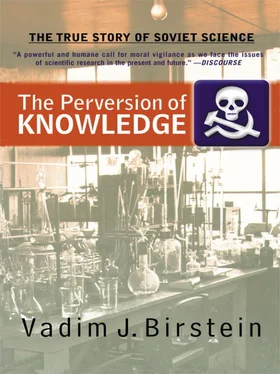Vadim Birstein - The Perversion of Knowledge
Здесь есть возможность читать онлайн «Vadim Birstein - The Perversion of Knowledge» весь текст электронной книги совершенно бесплатно (целиком полную версию без сокращений). В некоторых случаях можно слушать аудио, скачать через торрент в формате fb2 и присутствует краткое содержание. Город: Cambridge, MA, Год выпуска: 2004, ISBN: 2004, Издательство: Westview Press, Жанр: История, Публицистика, dissident, на английском языке. Описание произведения, (предисловие) а так же отзывы посетителей доступны на портале библиотеки ЛибКат.
- Название:The Perversion of Knowledge
- Автор:
- Издательство:Westview Press
- Жанр:
- Год:2004
- Город:Cambridge, MA
- ISBN:978-0-8133-4280-1
- Рейтинг книги:3 / 5. Голосов: 1
-
Избранное:Добавить в избранное
- Отзывы:
-
Ваша оценка:
- 60
- 1
- 2
- 3
- 4
- 5
The Perversion of Knowledge: краткое содержание, описание и аннотация
Предлагаем к чтению аннотацию, описание, краткое содержание или предисловие (зависит от того, что написал сам автор книги «The Perversion of Knowledge»). Если вы не нашли необходимую информацию о книге — напишите в комментариях, мы постараемся отыскать её.
, a history of Soviet science that focuses on its control by the KGB and the Communist Party, reveals the dark side of this glittering achievement.
Based on the author’s firsthand experience as a Soviet scientist, and drawing on extensive Russian language sources not easily available to the Western reader, the book includes shocking new information on biomedical experimentation on humans as well as an examination of the pernicious effects of Trofim Lysenko’s pseudo-biology. Also included are many poignant case histories of those who collaborated and those who managed to resist, focusing on the moral choices and consequences. The text is accompanied by the author’s own translations of key archival materials, making this work an essential resource for all those with a serious interest in Russian history.
[Contain tables.]
The Perversion of Knowledge — читать онлайн бесплатно полную книгу (весь текст) целиком
Ниже представлен текст книги, разбитый по страницам. Система сохранения места последней прочитанной страницы, позволяет с удобством читать онлайн бесплатно книгу «The Perversion of Knowledge», без необходимости каждый раз заново искать на чём Вы остановились. Поставьте закладку, и сможете в любой момент перейти на страницу, на которой закончили чтение.
Интервал:
Закладка:
IAM VERY GRATEFUL to my colleagues from the human rights organization Memorial (Moscow, Russia), Arsenii Roginsky, Nikita Petrov, Nikita Okhotin, and Gennady Kuzovkin, for their help in finding archival materials and their notes to the manuscript. Dr. Amy Knight (Institute of European and Russian Studies, Carleton University, Ottawa, Canada) and Susanne Berger (Washington, DC) patiently read the manuscript and made valuable comments. Dr. Milton Leitenberg (Center for International and Security Studies, University of Maryland) also suggested changes that improved the text immensely. Dr. Vil Mirzayanov (Princeton, NJ) provided me with the information on Soviet plans to use ricin as a chemical weapon. Dr. Maria Keipert (Politisches Archiv des Auswartigen Amt, Bonn, Germany) sent me information regarding the former German diplomats kept after World War II in Soviet captivity. Dr. Raissa Berg (Paris, France) helped me to understand many events of the 1930s–1940s. Dr. James Atz (American Museum of Natural History, NY) kindly allowed me to work with his collection of copies of papers on the Trofim Lysenko affair. Professor Erhard Geissler (Max Delbrück Center for Molecular Medicine, Berlin-Buch, Germany) sent me copies of some valuable archival materials and of his own works, despite his illness at that time. Ms. Catherine Fitzpatrick (New York) kindly provided me with a copy of her translation of the manuscript by Vladimir Bobryonev and Valery Ryazentsev. Dr. Anthony Rimmington (Center for Russian and East European Studies, University of Birmingham, Birminghan, U.K.) and Dr. Mark Wheelis (Division of Biological Sciences, University of California, Davis, CA) provided me with copies of their published and unpublished papers on biological weapons. Sergei Gitman (Moscow) gave me his photo of Vladimir Prison. Professor Daniel Wikler (Department of History of Medicine, University of Wisconsin, Madison, WI) invited me to give talks on the NKVD-MGB experiments on humans at the conferences Human Genome Research in an Independent World: International Aspects of Social and Ethical Issues in Human Genome Research (Bethesda, MD, June 2–4, 1991), and at the Third Congress of Bioethics (San Francisco, November 22–24, 1996). Mr. Tug Yourgrau, vice president of Powderhouse Productions, Inc. (Somerville, MA) invited me to participate in the TV report “Poisons—Discovery Magazine” (1997).
INTRODUCTION
THIS BOOK IS ABOUT the state control of science in the Soviet Union. Since I am a geneticist, my primary focus is on the fields I know best: biology and medicine. Several books have been published recently in English and Russian on the issue, but they cover only limited time periods. 1Moreover, they do not describe in detail the origins of the control and the leading role of the Soviet security services in establishing such control.
The Soviet regime was not the first to intervene in the work of the Russian Academy of Sciences and universities. The first incident occurred in the mid-eighteenth century. In 1747, Ribeiro Sanchez, a Jewish Portuguese doctor who had worked in Russia since 1731, was elected honorary academician of the St. Petersburg Academy of Sciences (established by Peter the Great in 1725) and received a pension from the academy. 2In 1732, Empress Elizabeth, the daughter of Peter the Great, ordered that Sanchez be deprived of his title and pension—the empress had issued a law prohibiting any Jew from living in the Russian Empire. Ironically, in 1762 the new Russian empress, Catherine the Great, ordered that Dr. Sanchez’s membership in the academy be restored. He had saved her life many years before, when she was fifteen. In later years, liberal university professors and teachers were under constant secret scrutiny by the Special Department of the Tsarist Police Department. 3However, a unique situation developed in the twentieth-century Soviet Union. Control grew with the development of a particular tool of control—the Soviet political secret service, or VCheKa (All-Russian Extraordinary Commission)—and continued during all its transformations into the current FSB (Federal Security Service) and SVR (Foreign Intelligence Service) (see Tables 1.1 and 1.2).
The Soviet Union’s efforts to control science were part of its larger effort to control the “intelligentsia”—not an easy Russian term to define. 4In general, it is used to describe educated middle-class intellectuals. But traditionally in Russia, members of the intelligentsia were considered to have high ethical standards and a moral obligation and commitment to popular enlightenment and education. From the earliest days of their power, the Bolsheviks treated the old intelligentsia as bourgeoisie, a class they thought should gradually disappear, to be replaced by newly educated industrial workers (the proletariat) and poor peasants. According to Bolshevik doctrine, Communist society should consist of just two classes: the proletariat and peasants. The newly created proletarian intelligentsia should form a layer between these two classes and serve them. For a while, during the Civil War (1918–1921) and the years of the New Economic Policy (NEP) declared by Vladimir Lenin, the regime to some extent tolerated the old “bourgeois” intelligentsia, which included scientists. The NEP included denationalization of small businesses and legalization of private trade—that is, some capitalist economic forms were allowed to coexist with the socialist forms. The NEP was proclaimed on March 15, 1921, at the Tenth Communist Party Congress, and it officially ended in December 1929 (it ended de facto in April 1928). 5With the demise of the NEP, any tolerance toward the old intelligentsia evaporated.
| No. | Office (Full Russian Name) | Name in English | Russian Acronym | Years of Existence | Main Areas of Responsibility |
|---|---|---|---|---|---|
| 1. | Narodnyi Komissariat Vnutrennikh Del RSFSR | People’s Commissariat of the Interior of the Russian Federation (RSFSR) | NKVD (of the RSFSR) | 1917–30 | Police function, organization of prisoners’ work |
| 2. | Vserossiiskaya Chrezvychainaya Komissiya pri Soviete Narodnykh Komissarov | All-Russian Emergency Comission under the Council of Soviet Commissars | VCheKa | 1917–22 | Actions against counterrevolution and sabotage |
| 3. | Gosudarstvennoe Politicheskoe Upravlenie pri NKVD RSFSR | State Political Directorate under the NKVD of the RSFSR | GPU | 1922 | Actions against counterrevolution, sabotage, spies, and smuggling; control of the state borders |
| 4. | Ob’edinennoe Gosudarstvennoe Politicheskoe Upravlenie pri Soviete Narodnykh Komissarov | United State Political Directorate under the Council of Soviet Commissars | OGPU | 1922–34 | Control of the local GPU offices and of special departments in the army |
| 5. | Narodnyi Komissariat Vnutrennikh Del SSSR (included Glavnoe Upravlenie Gosudarstvennoi Bezopasnosti) | The USSR People’s Commissariat of the Interior (a merged body of the OGPU and the Russian Federation NKVD; included Main State Security Directorate) | NKVD (included GUGB) | July 1934—February 1941 | GUGB: counterintelligence, intelligence, actions against political parties, anti-Soviet elements, and terrorists; control of special investigation prisons; GULAG: control of prisoners in prisons and labor camps; guarding state borders; OSO special trials; iietc. |
| 6. | Narodnyi Komissariat Vnutrennikh Del SSSR | The USSR People’s Commissariat of the Interior | NKVD | February 1941—July 1941 | Police; control of prisons, labor camps, concentration camps for POWs and of numerous directorates of slave labor camps in all branches of state economy, including Dalstroi; creation of special operational techniques; fire-fighting directorate; etc. |
| 7. | Narodnyi Komissariat Gosudarstvennoi Bezopasnosti SSSR (former GUGB) | The USSR State Security People’s Commissariat (former GUGB) | NKGB | February 1941—July 1941 | Foreign intelligence, counterintelligence, investigation of political cases, usage of operational techniques, etc. |
| 8. | Narodnyi Komissariat Vnutrennikh Del SSSR (NKVD merged with NKGB) | The USSR People’s Commissariat of the Interior | NKVD | July 1941—April 1943 | Foreign intelligence; counterintelligence; political surveillance; investigation of political cases; control of prisons, POW camps, GULAG , other labor camps in different branches of the economy; interior troops; creation of special operational techniques; control of state archives; etc. |
| 9. | Narodnyi Komissariat Vnutrennikh Del SSSR | The USSR People’s Commissariat of the Interior | NKVD | April 1943—March 1946 | Control of the GULAG and other labor camps in different branches of the economy; interior troops and border guards; etc. |
| 9. | Narodnyi Komissariat Gosudarstvennoi Bezopasnosti SSSR | The USSR State Security People’s Commissariat | NKGB | April 1943—March 1946 | Intelligence; counterintelligence; terrorist actions on the territories occupied by Germans; usage of the operational techniques; censorship; control of the state archives; etc. |
| 10. | Ministerstvo Gosudarstvennoi Bezopasnosti SSSR (former NKGB) | The USSR Ministry of State Security | MGB | March 1946—March 1953 | Intelligence; counterintelligence; military counterintelligence; usage of the operational techniques; censorship; investigation of political cases; creation of operational technique; usage of operational techniques; atomic espionage; OSO (special trials), etc. |
| 11. | Ministerstvo Vnutrennikh Del SSSR (former NKVD) | The USSR Ministry of the Interior | MVD | March 1946—March 1953 | Control of labor camps in all branches of economy; GULAG; OSO , different special troops (including the Border Guards and the Interior); etc. |
| 12. | Ministerstvo Vnutrennikh Del SSSR (MGB merged with MVD) | The USSR Ministry of the Interior | MVD | March 1953—March 1954 | All functions of the former MGB and MVD |
| 13. | Komitet Gosudarstvennoi Bezopasnosti pri Soviete Ministrov SSSR | Committee of State Security (under the USSR Council of Ministers) | KGB | March 1954—December 1991 | Foreign intelligence; counterintelligence; military counterintelligence; fight against anti-Soviet elements; operational and technical department; Border Guards; etc. |
| 14. | Ministerstvo Vnutrennikh Del SSSR | The USSR Ministry of the Interior | MVD | March 1954—August 1991 | Control of prisons and labor camps; police; interior troops; etc. |
| 15. | Tsentral’naya Sluzba Razvedki, later Sluzhba Vneshnei Razvedki (former Pervoe Glavnoe Upravlenie KGB) | Central Intelligence Service, later Foreign Intelligence Service (former First KGB Main Directorate) | TsSR, later SVR | December 1991—present | Foreign intelligence |
| 16. | Mezhrespublikanskaya Sluzhba Bezopasnosti | Interrepublican Security Service | MSB | November—December 1991 | Main KGB and MVD functions without foreign intelligence |
| 17. | Ministerstvo Bezopasnosti i Vnutrennikh Del | Ministry of Security and Internal Affairs | MBVD | December 1991—January 1992 | The same |
| 18. | Agenstvo Federal’noi Bezopasnosti | Federal Security Agency | AFB | January 1992 | The same |
| 19. | Ministerstvo Bezopasnosti, then Federal’naya Sluzhba Kontrrazvedki, then Federal’naya Sluzhba Bezopasnosti | Ministry of Security, then Federal Security Agency, then Federal Security Service | MB, then FSK, then FSB | 1992—present | Counterintelligence, military counterintelligence, transportation security, anti-terrorism actions, surveillance |
| 20. | Federal’noe Agenstvo Pravitel’stvennoi Svyazi i Informatsii (former 8th KGB Main Directorate, the 16th KGB Directorate, and Communication Troops) | Federal Agency for Government Communication and Information | FAPSI | December 1991—present | Control of government telephone lines, high-frequency communication systems, cryptography services |
| 21. | Glavnoe Upravlenie Okhrany (former 9th KGB Main Directorate) | Main Guard Directorate | GUO | December 1991—present | No legally defined function; accountable to the President. Includes Presidential Regiment and the Alfa Group (an elite special former 7th KGB Main Directorate commandos) |
| 22. | Federal’naya Pogranichnaya Sluzhba (former KGB Border Guards Main Directorate) | Federal Border Service | FPS | 1992—present | Guarding Russia’s land frontiers and the perimeter of the Russian Federation coastal waters |
| 23. | Ministerstvo Vnytrennikh Del | Ministry of Internal Affairs | MVD | 1991—present | Interior troops; police; fire-fighters department, etc. |
iData from Kokurin and Petrov, Lubyanka , pp. 7-102; Waller, J. M., Secret Empire: The KGB in Russia Today (Boulder, CO): Westview Press, 1994), pp. 118-141, and Knight, A., Spies Without Cloaks: The KGB’s Successors (Princeton, NJ: Princeton University Press, 1996), pp. 30-37; Mlechin, L., Predsedateli KGB: Rassekrechennye sud’by [The KGB Chairmen: Declassified Biographies] (Moscow: Tsentrpoligraf, 1999a), pp. 648-649 (in Russian).
Читать дальшеИнтервал:
Закладка:
Похожие книги на «The Perversion of Knowledge»
Представляем Вашему вниманию похожие книги на «The Perversion of Knowledge» списком для выбора. Мы отобрали схожую по названию и смыслу литературу в надежде предоставить читателям больше вариантов отыскать новые, интересные, ещё непрочитанные произведения.
Обсуждение, отзывы о книге «The Perversion of Knowledge» и просто собственные мнения читателей. Оставьте ваши комментарии, напишите, что Вы думаете о произведении, его смысле или главных героях. Укажите что конкретно понравилось, а что нет, и почему Вы так считаете.











